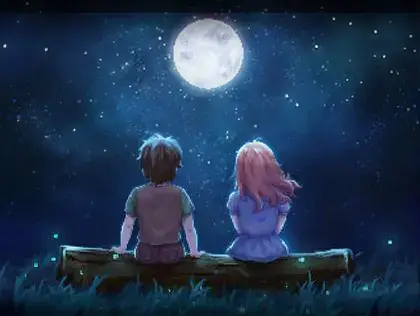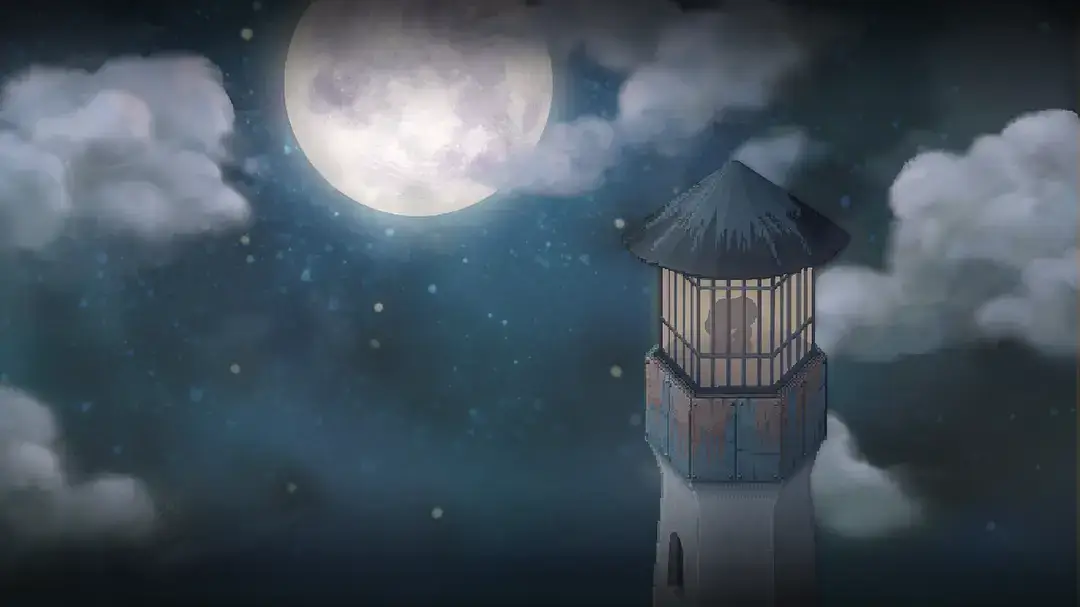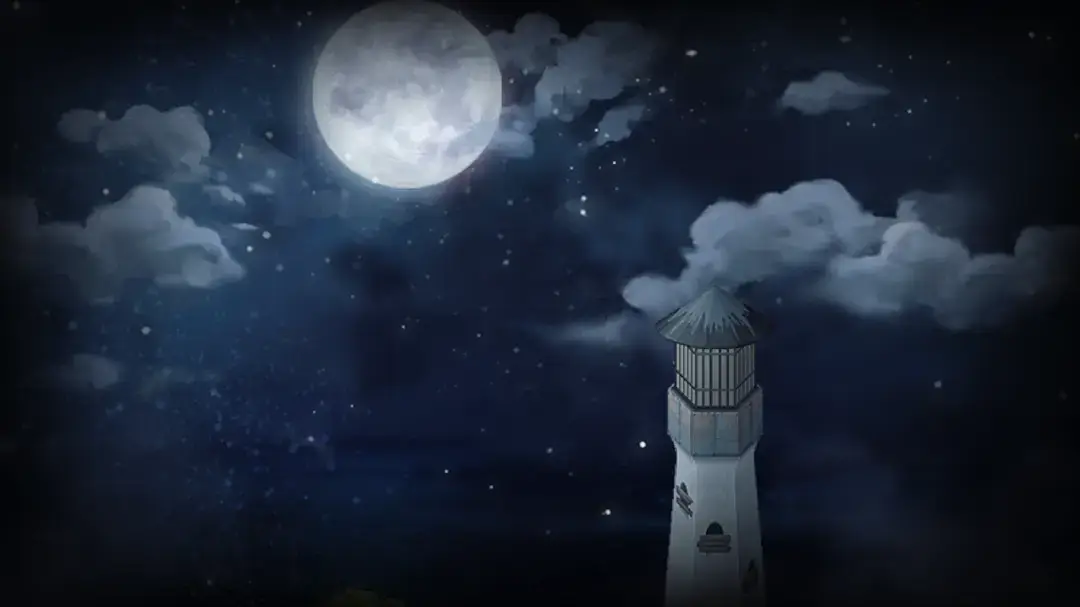I wish to spend my whole life healing you, yet it is I who am truly the patient.

“To the Moon” is not just a game; it feels more like an immersive film, engaging players in a deeply emotional experience. With a duration of around four hours (excluding non-essential actions and breaks, the playtime is closer to two and a half to three hours), the gameplay mainly involves guiding characters to achieve small goals to advance the story. These tasks are simple, like collecting memory fragments or solving small picture puzzles with no more than ten steps, which ensures a smooth and engaging narrative experience.
I initially tried to narrate the story but found that words alone couldn’t capture its depth and emotional twists. The poignant essence of the game is best experienced firsthand. Therefore, this summary is more suited for those who have already played the game, providing a broad overview:
The story has a sci-fi element where a scientific organization helps people fulfill their last wishes by creating a virtual reality that manifests their desires through altered memories, achieving a form of “psychological euthanasia.” Eva and Neil, a pair of doctors from this organization, are tasked with helping an elderly man named Johnny who wishes to go to the moon. The twist is that Johnny himself doesn’t know why he wants to go to the moon. The doctors decide to implant this dream into his childhood memories and find a reason for his desire, thus setting off a chain reaction that leads to the fulfillment of his wish. As they navigate Johnny’s memories, the truth about his love for his wife, River, unfolds before us.
Until the point where Johnny takes a memory-blocking drug, I perceived the story as a comedy, with the humorous banter between Dr. Eva and Dr. Neil adding a lighthearted touch. Johnny appeared to be a devoted husband, caring for his wife River, who had Asperger’s Syndrome. Despite her isolation and unconventional behavior, and her wish to avoid treatment in favor of saving money for Johnny to build a lighthouse, Johnny remained by her side.
It was only when forgotten childhood memories resurfaced that I realized the significance of the objects like the “rabbit, sandbag, lighthouse, and platypus” that Johnny had lost. These were crucial fragments of his shared memories with River. River had patiently held onto these memories, making repeated efforts to awaken Johnny’s recollections despite widespread misunderstanding. Ultimately, it was River who faced a life of regret and loneliness. To Johnny, the symbolic paper rabbits were merely “paper rabbits,” and the once-beloved platypus was simply discarded in the basement.
Even though Johnny subconsciously hoped to go to the moon to reunite with River, and he achieved a form of “psychological euthanasia,” he still lost River and the testament of their love along the way. He believed that his life had been full of love and care, but from the start, he was the one who was truly lost.

In its three-hour narrative, the story beautifully illustrates three profound characteristics of love: serendipity, disarray, and inexplicability. Johnny and River’s love had a fairy-tale quality to it, from their serendipitous childhood meeting to their fateful high school connection. River’s Asperger’s and Johnny’s childhood trauma created a complex bond that added depth and sorrow to their love story. Neither could be blamed; River’s silent devotion was remarkable, and even in his forgetfulness, Johnny’s love remained steadfast.
Reflecting on the game’s opening dialogue, one is filled with a sense of melancholy:
— “I want to go to the moon.”
— “Why? Wealth? Fame? There must be a reason.”
— “I don’t know. I just want to go.”
Loneliness is often a result of life’s many disappointments, with few understanding it fully. Solitude is external; lack of understanding is deeper loneliness. Both River and Johnny were deeply lonely individuals, and their companionship made them feel less alone.
Humans are built from memories, and Johnny’s loss of memory due to a drug led to an incomplete personality and a misaligned sense of self. He liked things that Joey liked but couldn’t remember their significance. Did he ever doubt himself, carrying unspoken burdens?
River’s loneliness began with Johnny and ultimately rested with him. The current loneliness is manageable, but the anticipated long-term loneliness is daunting. At the moment Johnny threw the sandbag off the lighthouse or dismissed the paper rabbit as “just a paper rabbit,” River knew that the little John from their childhood was gone. She foresaw a prolonged solitude and chose to endure it silently.
We can never truly measure another’s pain, and perhaps the game isn’t meant to maximize our experience of the protagonists’ suffering. The loneliness of the game’s characters mirrors the loneliness of the players. We seek meaning and answers: the meaning of love, marriage, combating loneliness, and relationships. Beyond appreciating the beauty of love and its complex flavors, this story prompts reflection on relationships—never to be solely about one’s own sacrifices. As the title suggests, “I wish to spend my whole life healing you, yet it is I who am truly the patient.”

Initially, we read literature to experience other people’s lives, and often find ourselves moved to tears by the points of deep resonance. Later, films transformed the imagination sparked by text into images that felt closer to reality, making our tears even more natural. Today, games combine high-quality writing, music, and visuals, allowing us to control main characters and participate from a unique perspective. This blend of storytelling, realism, and immersion creates an ultimate experience of alternate lives.
Tears shed over a comedy are the highest praise for a comedy’s ability to transcend its original function of merely making us laugh. Similarly, the melancholy elicited by games can be seen as a wonderful acknowledgment of their evolution beyond traditional entertainment. Once seen as a scourge and a corruptor of youth, some games have now distanced themselves from mere distractions like “Honor of Kings.” They are no longer merely time-wasting programs; they seek meaning, provoke thought, and perhaps this is why games are now considered the ninth art.
(via 许安戈_, douban | Translated | Contact Us)
River had Asperger’s Syndrome, and although she wanted to connect with the world, she struggled to express herself. She cut her long hair, constantly clutched a platypus, and folded paper rabbits over and over—all in an attempt to awaken Johnny’s memories. It’s hard to imagine how lonely and helpless she must have felt during that time. Johnny, due to the memory-blocking drug, had lost all recollection. He no longer remembered what the yellow-bellied, blue-bodied rabbit symbolized, nor did he recall the night he first met River, beneath the stars, when they made a promise: if you ever get lost or forget, we will still meet on the moon. Thinking of this, even a typically stoic person like me found tears welling up in my eyes.